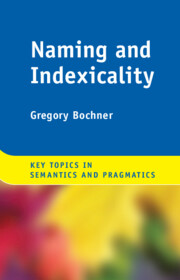
-
Select format
-
- Publisher:
- Cambridge University Press
- Publication date:
- December 2021
- December 2021
- ISBN:
- 9781316999073
- 9781108428453
- 9781108449687
- Dimensions:
- (216 x 138 mm)
- Weight & Pages:
- 0.501kg, 298 Pages
- Dimensions:
- (216 x 140 mm)
- Weight & Pages:
- 0.4kg, 298 Pages
You may already have access via personal or institutional login
Book description
How do words stand for things? Taking ideas from philosophical semantics and pragmatics, this book offers a unique, detailed, and critical survey of central debates concerning linguistic reference in the twentieth century. It then uses the survey to identify and argue for a novel version of current 'two-dimensional' theories of meaning, which generalise the context-dependency of indexical expressions. The survey highlights the history of tensions between semantic and epistemic constraints on plausible theories of word meaning, from analytic philosophy and modern truth-conditional semantics, to the Referentialist and Externalist revolutions in theories of meaning, to the more recent reconciliatory ambition of two-dimensionalists. It clearly introduces technical semantical notions, theses, and arguments, with easy-to-follow, step-by-step guides. Wide-ranging in its scope, yet offering an accessible route into literature that can seem complex and technical, this will be essential reading for advanced students, and academic researchers in semantics, pragmatics, and philosophy of language.
Contents
Metrics
Full text views
Full text views help Loading metrics...
Loading metrics...
* Views captured on Cambridge Core between #date#. This data will be updated every 24 hours.
Usage data cannot currently be displayed.
Accessibility standard: Unknown
Why this information is here
This section outlines the accessibility features of this content - including support for screen readers, full keyboard navigation and high-contrast display options. This may not be relevant for you.
Accessibility Information
Accessibility compliance for the PDF of this book is currently unknown and may be updated in the future.


